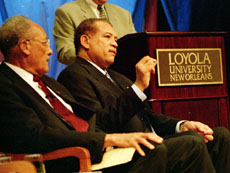Six of the city’s mayoral hopefuls met at Loyola’s Nunemaker Auditorium Monday for a music business forum that one professor described as a big step for the New Orleans music community.”This was the first ever music-based discussion,” said Scott Fredrickson, head of the music business program at Loyola. In the first minutes of the forum, the panel began to question the candidates’ understanding of the issues.After candidate Emile Labat said New Orleans has “no venues, no editing studios and no recording studios,” Ramsey said he should look through offBEAT magazine to find advertisments for the many that we do have.The candidates were asked to define the music industry. Councilman Troy Carter said it is the interaction among three groups of people: performers, recorders and enthusiasts.”We have people with talent [in New Orleans]… we need to be helpers to them,” Carter said.Fredrickson said he was disappointed that some candidates did not have a good grasp of the issues.”In my opinion, some candidates didn’t have a clue,” Fredrickson said. “So do they care?”Labat, Carter, Sen. Paulette Irons, Councilman James Singleton, Police Chief Richard Pennington, Ray Nagin and Clarence Hunt, who arrived more than 20 minutes late, took part in the forum.”We wanted to get a diverse group of people from many different backgrounds,” Fredrickson said. “All the major candidates were able to make appearances.”Pennington and Irons left in the first hour of the forum.Fredrickson was among the panelists, who also included Jan Ramsey, publisher of offBEAT magazine.The forum centered on political issues. The two most prominent were the New Orleans Music and Entertainment Commission and the Amusement Tax, which taxes musicians and venues for live music. All candidates said both need to be revised.”We made attempts to eliminate the Amusement Tax; . . .we were able to cut it by 50 percent,” Carter said. “We need to abolish it.”Nagin said the tax and the commission hurt New Orleans’ music industry.”The commission is finishing the job [of eliminating jazz from the city],” Nagin said.Pennington said the commission could play an important role in the development of the music industry. In order to attain the organization’s goals, its director must be someone with a solid background in music business, Pennington said.”The objective [of the commission] is simple: to build a music business infrastructure that will encourage local musical talent and entrepreneurs as well as attract people and investments from outside the city,” Pennington said.Nagin said the best way to help the New Orleans music industry is to educate musicians.”I will support funding for music and arts education in the public schools,” Nagin said. “This is an important part of a well-rounded education and should not be the first thing on the chopping block when it’s time for cuts.”Although many of the candidates expressed an interest in music education, none mentioned the program that exists at Loyola.”We sent [the candidates] a set of questions before the forum,” Fredrickson said. “But the few that were sent back were answered by the candidates’ spokesmen.” Candidates also discussed the future of the Grammy Hall of Fame in New Orleans. Irons said it is a good opportunity for New Orleans.”I am hopeful that it will include performance and educational opportunities for local musicians,” Irons said. “I believe the museum should also feature New Orleans musical heritage and local music as part of New Orleans’ living culture.”All the candidates said New Orleans has the talent and ability to be the “Music Capitol of the World,” as Fortune magazine said of Austin, Texas. “New Orleans has everything we need. We just need to change direction,” Nagin said. “When we do, we are going to light the world on fire.”The other panelists – who inculded Gregory Davis, musician and booking agent for Festival Productions; Kim Richardson, music attorney; David Freedman, general manager of WWOZ Radio; Edgar Chase, dean of the Division of Business at Dillard University; and “Deacon John” Moore, a musician. Jerry Goolsby, the Distinguished Chair of Music Industry Studies at Loyola and moderator of the forum – are all members of the local music community. For this reason, Fredrickson said, the forum was a step toward organizing a vulnerable New Orleans music industry.”Why not tax musicians? What can they do… there are no unions,” Fredrickson said. “There needs to be a change from the incompetence in the industry… This is a perfect opportunity.”
Categories:
Mayoral candidates discuss music business at Loyola-sponsored forum
January 17, 2002

Mayoral hopefuls Councilman Jim Singelton, left, and Richard Pennington, right, field questions during Loyola’s mayoral forum sponsored by the Music Busines Program and offBeat magazine. Scott Fredrickson, head of the music business program, said the fo
0
More to Discover






